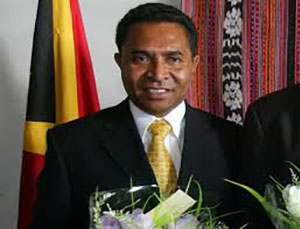
Paul Cleary
SYDNEY (The Australian/Pacific Media Watch): Timor-Leste Prime Minister Rui de Araujo has lashed out at Western critics, saying their nations had “acquiesced” to the 24 years of Indonesian occupation.
Dr de Araujo responded to a letter from four press freedom groups condemning his defamation action against two journalists, and the related criminal sanctions in Timor’s penal code.
The letter says the case against two Timor Post journalists is seeking to apply Article 285 of the Penal Code, the “slanderous denunciation” clause, which carries a penalty of three years’ jail.
The media freedom groups say the case is already “engendering a culture of fear and intimidation among journalists who report on issues of national import”.
Raimundos Oki and former editor Lourenco Martins have been called before the prosecutor’s office for interview after Dr de Araujo filed the suit, and have had limitations placed on their freedom of movement.
“We strongly urge you to call on the prosecutor-general to drop these damaging charges and to consider legal reforms that abolish Article 285,” says the Committee to Protect Journalists, Freedom House, the International Federation of Journalists and the Southeast Asia Journalists Union.
Dr de Aruajo hit back fiercely in a four- page response obtained by The Weekend Australian.
He said he was a Timorese citizen who had “endured harassment during 24 years of Indonesia occupation, acquiesced by all major Western powers”, including “by some of the worldwide press advocates”.
He would not trade “press freedom and freedom of expression with "press irresponsibility" and "irresponsible expression of freedom".”
The case centres on an article last November that reported on the awarding of a US$13.4 million contract to install IT in the new finance ministry.
Ministry adviser
Dr de Araujo was working as an adviser in the ministry when the contract was awarded. His main contention appears to be that the newspaper published the wrong name for the company that won the contract.
Surprisingly, he claimed “there is no such thing as ‘criminal defamation’ in East Timor”.
However, a UN translation of the code states that any person who “informs or casts suspicion on a certain person regarding commission of a crime, with the intent of having criminal proceedings initiated against said person, is punishable with up to three years’ imprisonment".
Australian lawyer Jim Nolan, who is acting for the journalists, says the investigation is aimed at “finding material to ‘fit’ the contorted features of the ‘crime’ created by article 285”.
Nolan was speaking this week at a conference on press freedom in Dili.
It was “repugnant” that the prosecutor had placed legal restrictions on the freedom of movement of the two journalists.
Global media freedom groups call on PM to drop defamation case
This work is licensed under a Creative Commons Attribution-NonCommercial 3




